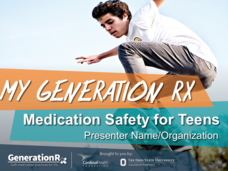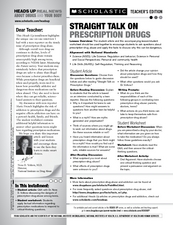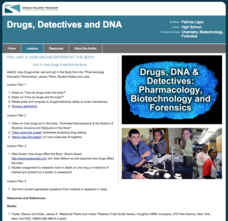National Education Association
Rx for Understanding: Preventing Prescription Drug Abuse
Did you know more than 2,000 teens begin abusing prescription drugs each day? Ensure your learners are educated about the crucial health issue of prescription drug abuse with this unit.
PBS
Stories of Painkiller Addiction: Prescription Drug Abuse Awareness Campaign
The I-STOP law was designed to regulate the distribution and tracking of prescription drugs. After reading an article about its signing and implementation, middle and high schoolers work together to come up with their own ideas for an...
Scholastic
Prescription Drug Abuse: Teens in Danger
Students identify the most abused prescription drugs. In this drug awareness lesson, students discuss the harmful effects of taking drugs prescribed to someone else. They take a quiz before and after the lesson to check how much they...
Scholastic
Recovery From Drug Addiction
Are there factors that put some individuals at a higher risk for drug addiction than others? Learn more about the risk factors that may make some people more susceptible to addiction, as well as protective factors that help prevent...
Generation Rx
Medication Safety for Teens
The most valuable way to protect teenagers from prescription drug abuse is to equip them with knowledge. An informative slideshow covers various aspects of prescription drug safety, including the importance of keeping one's prescription...
The New York Times
Investigating the Heroin and Prescription Opioid Epidemic
How bad is the opioid crisis in America? Has it gotten worse in the last few decades? Why? High schoolers delve into these questions with a thorough and thoughtful lesson from The New York Times on heroin prescription opioids. Starting...
Generation Rx
My Generation Rx: Minute Activities
Want to discuss the prevalence of prescription drug abuse among teenagers, but running out of class time? A series of short, straightforward activities address topics such as sharing prescription drugs, coping mechanisms for stress, and...
National Institute on Drug Abuse
The Brain's Response to Drugs
Marijuana affects the brain differently than inhalants, which have a different effect than opioids. Elementary and middle school classes read about these drugs as well as nicotine, methamphetamine, hallucinogens, and steroids before...
Scholastic
Straight Talk on Prescription Drugs
Young scholars discover how doctors custom fit prescription drugs to patients. For this health science instructional activity, students explain the risks associated with drug abuse. They discuss common myths about prescription drugs.
Generation Rx
My Generation Rx: Plot Twists
How can prescription drugs be dangerous if they were prescribed by a doctor? Is it okay to share your prescription drugs with friends if they really need them? Clear up any common misconceptions about prescription drugs with a set of...
Foundation for a Drug-Free World
The Truth About Drugs
Teenagers hear many messages about drugs from advertisements, their peers, their teachers, and their parents. But who is lying? What is the truth? A thorough, thoughtful unit takes a purposeful look at drug education, drug culture, and...
Nemours KidsHealth
Drugs: Grades 6-8
What happens to your body when you use drugs? What do you do if your friend wants you to start using? Learn about the signs of addiction and the ways to withstand peer pressure with two classroom activities. After storyboarding the...
PBS
Stories of Painkiller Addiction: Myth or Fact
Are opioids the most abused drug after marijuana? How hard is it for young people to obtain painkillers without a prescription? Middle and high schoolers explore the growing epidemic of opioid addiction with a lesson that prompts them to...
Scholastic
Prescription Pain Medication: What You Need to Know
The national epidemic of opioid addiction is making its way into high school populations. Educate the young scholars in your class about the ways prescription opioids can both block pain and deliver large amounts of dopamine that make it...
National Association of School Nurses
Learn to Be Smart and Safe with Medicine
The stated purpose of a school tool kit is to help schools implement teen prescription drug abuse awareness programs. The kit includes actions that groups can take in the school, with parents, and in the community at large.
Generation Rx
My Generation Rx: Lead the Scene
Prescription drugs may start out with legitimate usage, but lately they are finding their way to high school and college party life. Have a discussion with the teenagers in your class on prescription drug abuse with a PowerPoint...
Nemours KidsHealth
Drugs: Grades 9-12
What do drugs do to the body and to the mind? What are the dangers of using drugs? How can teens respond to the pressure to use drugs? After reading a series of articles related to drug use and abuse, class members prepare a skit to...
US National Library of Medicine
Drug Use and Abuse: Past and Present
Pick your poison: tobacco, alcohol, opiates, cocaine, or marijuana. An online exhibition launches a research project that asks groups to select one of the five drugs and gather information on how the use of the drug and the regulations...
Kenan Fellows
Unit 3: How Drugs Enter/Exit the Body
The third of a four-part series on Pharmacology teaches scholars how drugs enter and exit the body, how they act inside the body, how they affect the brain, and more. Over the course of the unit, groups complete two labs and one...
PBS
Stories of Painkiller Addiction: Decisions and Consequences
Teach young learners that most drug addictions end in one of three outcomes: treatment, jail, or death. After watching a short video segment on the consequences of drug abuse, class members discuss what they viewed and consider what...
PBS
Stories of Painkiller Addiction: The Cycle of Addiction
Drug addiction, including prescription drug addiction, begins with a reason that's different for every user. High schoolers learn more about the reasons people begin abusing drugs with a set of videos and worksheets that discuss four...
Florida Department of Health
Understanding the Risk of Substance Abuse Unit
Teenage brains are different! Understanding that the teenage brain is still developing and thus more impacted by substance abuse is the key concept in a three-lesson high school health unit. Participants learn about how the brain and...
Curated OER
Prescription for Trouble
Students consider the risks of the over-the-counter (OTC) drug use. In this personal health lesson, students watch "Prescription for Trouble," and discuss illegal use of drugs. Students complete a survey about OTC and illegal drug use in...
Curated OER
Drugs
Students explore peer pressure by completing worksheets. In this drug awareness lesson, students define a long list of illegal and prescription drugs while viewing images of each drug. Students complete a word match worksheet and conduct...

























